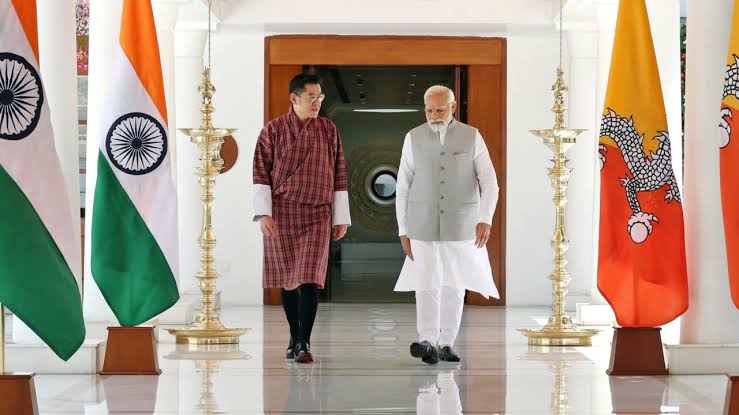India, Bhutan unbreakable Long – standing bilateral ties

The King of Bhutan, Jigme Khesar Namgyel, embarked on a three-day visit to India in early April. His visit presented an opportunity for both nations to reflect on their long-standing bilateral ties and further reinforce their friendship. The joint statement issued after the visit underlined the extensive cooperation between India and Bhutan in different sectors, reported The Bhutan Live.
In addition to the two existing facilities, India reaffirmed its support for Bhutan’s upcoming development objectives, which include the provision of standby lines of credit. Particular focus was given to the hydropower industry, which is the bedrock of relations between India and Bhutan.
Numerous requests from Bhutan have been addressed by India, including quickening the long-delayed Sankosh and Punatsangchhu hydropower projects. Additionally, India has promised to increase the hydroelectricity rates for Bhutan starting at Chhukha. Additionally, the Basochhu power project is covered by an agreement wherein India will buy electricity. In addition to hydropower, priority will be given to non-hydro renewable energy sources like solar power and e-mobility.
An integrated checkpoint for trucks and a separate checkpoint for foreign nationals would be established at Jaigaon in the area of infrastructure development. Additionally, the first-ever train link between the two countries has been planned between Kokrajhar in Assam and Gelephu in the Sarpang district of Bhutan, according to The Bhutan Live.
The presidents of the two nations also spoke on institutional capacity building, financial support for Bhutan’s internal reform drive, and the 13th Five-Year Plan, which is Bhutan’s current plan for the next five years. India and Bhutan will collaborate on new “long-term sustainable” agreements for Bhutanese agricultural exports to India. The task of establishing a structure to supply Bhutan with essential goods like fuel, fertiliser, and coal is also on the anvil, as per The Bhutan Live.
These advances complement the two countries’ existing robust bilateral collaboration and engagement in a number of sectors. The relationship between India and Bhutan for its growth goes far beyond the hydropower industry and touches practically every field, including education, infrastructure, social services, and technological advances, among others.
India would provide grant assistance totalling Rs 4,500 crores for Bhutan’s 12th Five Year Plan (2018-2023), as well as a transitional Trade Support Facility totalling INR 400 crores over a five-year period, to improve economic ties.
The recent launch of a joint India-Bhutan SAT satellite by ISRO ushers in a new era of India-Bhutan relations in science and technology cooperation.
Bhutan is anticipated to benefit from this satellite’s ability to provide real-time data and high-resolution images for land mapping and to facilitate the management of its forests, natural resources, and agriculture. This progress is consistent with the strengthening ties between India and Bhutan in new areas including cutting-edge technology, space exploration, and digital systems, The Bhutan Live reported.
RuPay, integrating Bhutan’s DrukREN with India’s national Knowledge Network, and building Ground Earth Station by ISRO to utilise South Asia Satellite services are just a few of the significant efforts that have already been launched in the realms of digital and space.
In order to maximise the potential of Bhutanese youth through the development of skills and the creation of jobs, India is facilitating the development of Bhutan’s digital and space infrastructure.
India is expanding its technological footprint through digital and space collaboration, while Bhutan is gaining from India’s investments and know-how in transforming these areas in Bhutan.
Bhutan’s socioeconomic progress and territorial integrity have always been a priority for India in terms of its foreign policy objectives.
Bhutan King’s visit to India was an effort to strengthen and reaffirm the relationship between the two neighbours.
The pillars of trust, goodwill, and mutual understanding serve as the foundation of the relationship between India and Bhutan. The two neighbours share a long-standing, deep civilisational, cultural, and economic relationship, The Bhutan Live reported.
The Indo-Bhutan Friendship Treaty, signed in 1949, laid the foundation for this partnership by emphasising “perpetual peace and friendship, free trade and commerce, and equal justice to each other’s citizens.”
Bhutan not only borders four Indian states on a 699-kilometre-long border with India, but it also plays a significant role in two of India’s core foreign policy initiatives, the Act East Policy and the Neighbourhood Policy, according to The Bhutan Live.
India has constantly placed a high priority on Bhutan’s territorial integrity and socioeconomic development throughout its entire foreign policy agenda, demonstrating the two countries’ longstanding friendship and strategic alliance.
Bhutan has reaffirmed its dedication to upholding its “time-tested” friendly relationship with India in this regard, working to inform and involve its neighbour in any talks or agreements that may impact India’s national security, The Bhutan Live reported.



